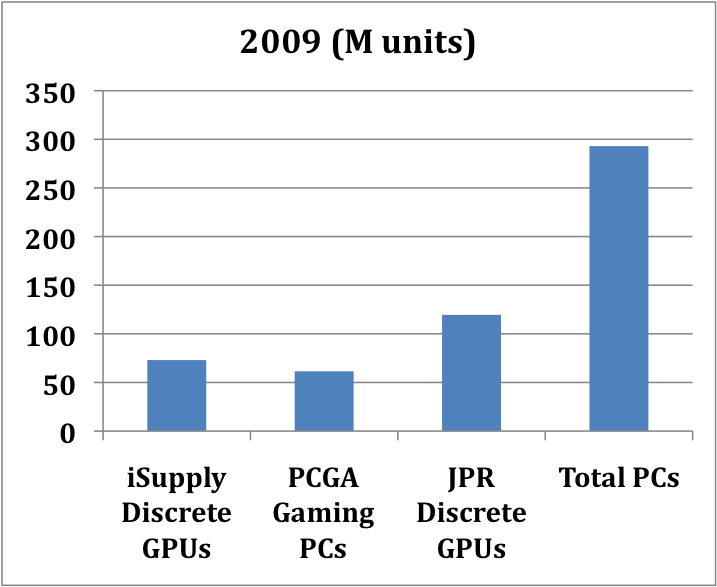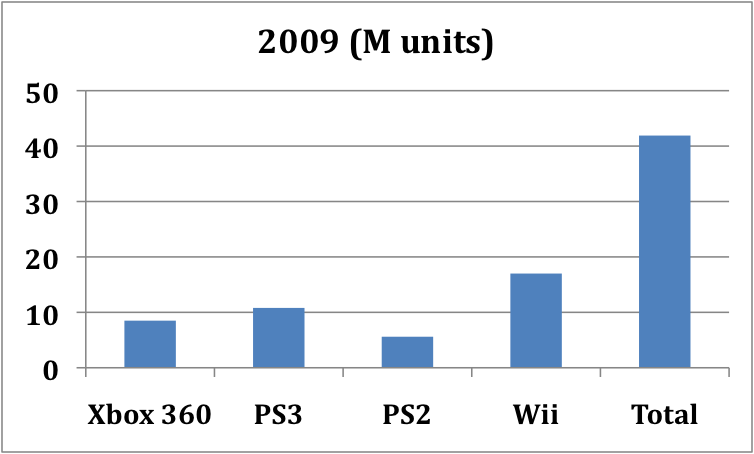Someone said you can make statistics prove anything you want and that person is right. It all comes down to what you use for definitions of the item under scrutiny. It also has to do with how you count things.
The PC Gaming Alliance (PCGA) recently put out a press-release that stated, “Annual shipment volumes for the PC Gaming hardware market in 2009 were over two times larger than the combined Wii, PlayStation 2, PlayStation 3 and Xbox 360 console units shipped in the same period. They then estimated the worldwide number of consumers gaming with discrete graphics solutions on their PCs (Desktop and Notebooks) shipped in 2009 to be 61.5 million PCs (Desktop and Laptops) shipped in 2009 that can largely be associated with PC gaming as a key usage scenario. The news release is available here.
Recently iSuppli said, “sales of tablets and notebooks will depress discrete graphics device shipments from 73 million in 2009 to 62 million in 2014.” That press release is here.
And those lovable folks at JPR said, “In 2009 119.5 million desktops and notebook discrete GPUs capable of playing DirectX 10 or better games were shipped, and that number should rise to 226.5 million by 2014.” Read our release here.
How could all vary so widely? It’s all in how, and what you count, and what the point is you’re trying to prove.
Because we get the shipment numbers directly from the chip suppliers (and have done so for a couple of decades) we tend to think our data is more accurate. But we report raw numbers, and some of those GPUs don’t go into conventional PCs, some are in the distribution channel waiting to be bought, and some PCs have more than one of them.
IDC thinks there were 296 million PCs shipped in 2009 and Gartner thinks 290.7 million shipped. Of course a lot of those machines had integrated graphics in them, and neither Gartner nor IDC include the embedded PCs found in ATMs, scientific instruments, and various industrial or military systems.

Although the PCGA claims “Gaming PCs Outgrow Console Gaming Systems,” they didn’t state how many consoles they thought shipped in 2009. The number is almost 42 million.

Console shipments in 2009
So, no matter whose PC or discrete GPU numbers you use, PCs capable of gaming clearly outsold consoles in 2009.
But here again you run into that definition thing. Of all those gaming-capable PCs, how many are actually used for gaming? And what percent of the time? A console is used about 80% of the time for gaming (the rest for watching movies or listening to music.) We think maybe 70 million PCs are used in some form of gaming, and maybe two million PCs are dedicated to gaming, the rest are time-shared with various other applications.
Who cares about these statistics? Do you think they influence a consumer on a buying decision? Can you imagine someone in a shop saying, “Gee, PCs out sell consoles, maybe I better buy a PC.” Well, actually I can imagine some people saying that, but not too many of them.
Pirates, ports, and BS
The people who care the most about these stats are the game developers. They try to use them to make big dollar decisions on what games to develop and for what platform. However, the numbers don’t seem to have much influence on their logic. The game publishers still prefer the console. For one thing it’s only DirectX 9, therefore development is easier. For another, it’s stable so developers can reuse assets developed in 2005. The number 1 excuse the game developers themselves offer for their loyalty to the console, is that PC games can be pirated. They seem to completely overlook the fact that console games also get pirated – over 9.78 million in just December of 2009, according to a recent study conducted by the International Intellectual Property Alliance and the Entertainment Software Association.
The publishers also like consoles because it’s relatively easy to do a port to a PC from a console game, especially an Xbox game.
So what?
So we and all the other bean counters will continue to, well, count the beans, and publish reports about them, and draw conclusions about what it all means. And the game publishers will continue to ignore us and put out mostly crappy remakes of older games. But we’ll have damn fine DirectX 11, multi-core CPUs and 21-inch 1980 displays to play them on – and in stereo.